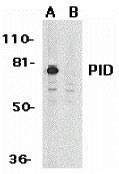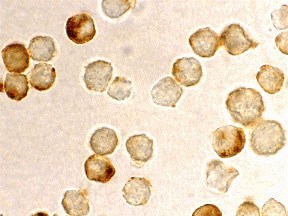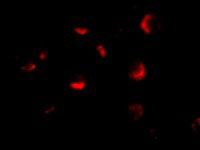PID Antibody
- SPECIFICATION
- CITATIONS
- PROTOCOLS
- BACKGROUND

Application
| WB, IF, ICC, E |
|---|---|
| Primary Accession | O94776 |
| Other Accession | AAG02241, 9931638 |
| Reactivity | Human, Mouse, Rat |
| Host | Rabbit |
| Clonality | Polyclonal |
| Isotype | IgG |
| Calculated MW | Predicted: 73 kDa Observed: 75 kDa |
| Application Notes | PID antibody can be used for detection of PID by Western blot at 1 µg/mL. Antibody can also be used for immunocytochemistry starting at 10 µg/mL. For immunofluorescence start at 10 µg/mL. |
| Gene ID | 9219 |
|---|---|
| Other Names | PID Antibody: PID, MTA1L1, PID, Metastasis-associated protein MTA2, Metastasis-associated 1-like 1, MTA1-L1 protein, metastasis associated 1 family, member 2 |
| Target/Specificity | MTA2; PID antibody is predicted to not cross-react with MTA2 |
| Reconstitution & Storage | PID antibody can be stored at 4℃ for three months and -20℃, stable for up to one year. As with all antibodies care should be taken to avoid repeated freeze thaw cycles. Antibodies should not be exposed to prolonged high temperatures. |
| Precautions | PID Antibody is for research use only and not for use in diagnostic or therapeutic procedures. |
| Name | MTA2 |
|---|---|
| Synonyms | MTA1L1, PID |
| Function | May function as a transcriptional coregulator (PubMed:16428440, PubMed:28977666). Acts as a component of the histone deacetylase NuRD complex which participates in the remodeling of chromatin (PubMed:16428440, PubMed:28977666). |
| Cellular Location | Nucleus {ECO:0000255|PROSITE-ProRule:PRU00512, ECO:0000255|PROSITE-ProRule:PRU00624, ECO:0000269|PubMed:28977666, ECO:0000269|PubMed:33283408} |
| Tissue Location | Widely expressed. |

Thousands of laboratories across the world have published research that depended on the performance of antibodies from Abcepta to advance their research. Check out links to articles that cite our products in major peer-reviewed journals, organized by research category.
info@abcepta.com, and receive a free "I Love Antibodies" mug.
Provided below are standard protocols that you may find useful for product applications.
Background
PID Antibody: The p53 tumor-suppressor gene integrates numerous signals that control cell life and death. Several novel molecules involved in p53 pathway, including Chk2, p53R2, p53AIP1, Noxa, PIDD, and PID/MTA2, were recently discovered. The transcriptional activity of p53 is modulated by protein stability and acetylation. PID/MTA2, also termed MTA1-L1, was found to be a subunit of nucleosome remodeling and deacetylating (NRD/NuRD) complex. PID/MTA2 modulates the enzymatic activity of the histone deacetylase complex and its expression reduces the levels of acetylated p53. Deacetylation of p53 by PID/MTA2 represses p53-dependent transcriptional activation and modulates p53-mediated cell growth arrest and apoptosis. PID/MTA2 is ubiquitously expressed in human tissues.
References
Matsuoka S, Huang M, and Elledge SJ. Linkage of ATM to cell cycle regulation by the Chk2 protein kinase. Science 1998; 282:1893-7.
Tanaka H, Arakawa H, Yamaguchi T, et al. A ribonucleotide reductase gene involved in a p53-dependent cell-cycle checkpoint for DNA damage. Nature 2000; 404:42-9.
Oda E, Ohki R, Murasawa H, et al. Noxa, a BH3-only member of the Bcl-2 family and candidate mediator of p53-induced apoptosis. Science 2000; 288:1053-8.
Oda K, Arakawa H, Tanaka T, et al. p53AIP1, a potential mediator of p53-dependent apoptosis, and its regulation by Ser-46-phosphorylated p53. Cell 2000;102:849-62.
If you have used an Abcepta product and would like to share how it has performed, please click on the "Submit Review" button and provide the requested information. Our staff will examine and post your review and contact you if needed.
If you have any additional inquiries please email technical services at tech@abcepta.com.













 Foundational characteristics of cancer include proliferation, angiogenesis, migration, evasion of apoptosis, and cellular immortality. Find key markers for these cellular processes and antibodies to detect them.
Foundational characteristics of cancer include proliferation, angiogenesis, migration, evasion of apoptosis, and cellular immortality. Find key markers for these cellular processes and antibodies to detect them. The SUMOplot™ Analysis Program predicts and scores sumoylation sites in your protein. SUMOylation is a post-translational modification involved in various cellular processes, such as nuclear-cytosolic transport, transcriptional regulation, apoptosis, protein stability, response to stress, and progression through the cell cycle.
The SUMOplot™ Analysis Program predicts and scores sumoylation sites in your protein. SUMOylation is a post-translational modification involved in various cellular processes, such as nuclear-cytosolic transport, transcriptional regulation, apoptosis, protein stability, response to stress, and progression through the cell cycle. The Autophagy Receptor Motif Plotter predicts and scores autophagy receptor binding sites in your protein. Identifying proteins connected to this pathway is critical to understanding the role of autophagy in physiological as well as pathological processes such as development, differentiation, neurodegenerative diseases, stress, infection, and cancer.
The Autophagy Receptor Motif Plotter predicts and scores autophagy receptor binding sites in your protein. Identifying proteins connected to this pathway is critical to understanding the role of autophagy in physiological as well as pathological processes such as development, differentiation, neurodegenerative diseases, stress, infection, and cancer.




